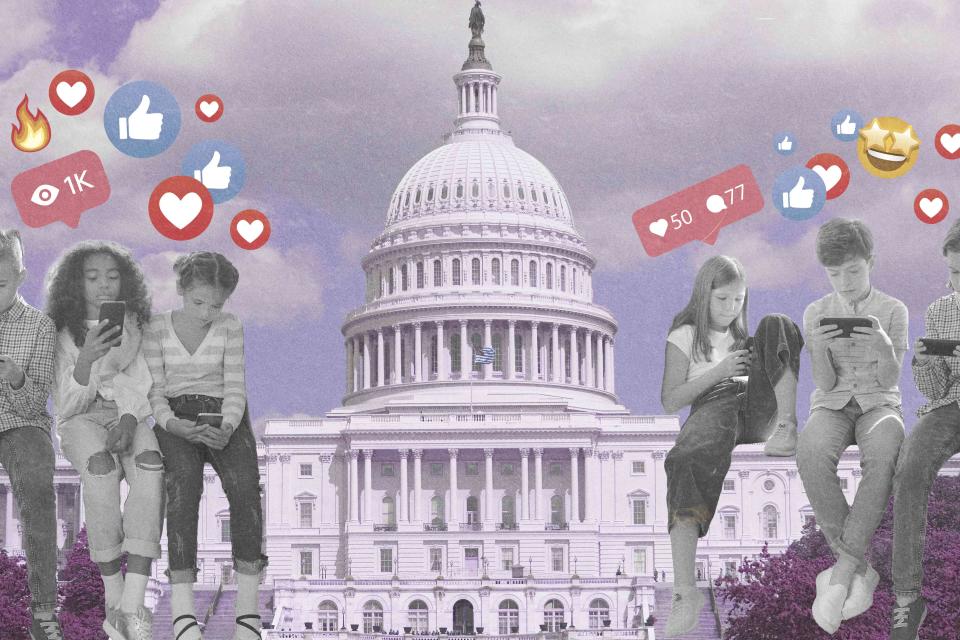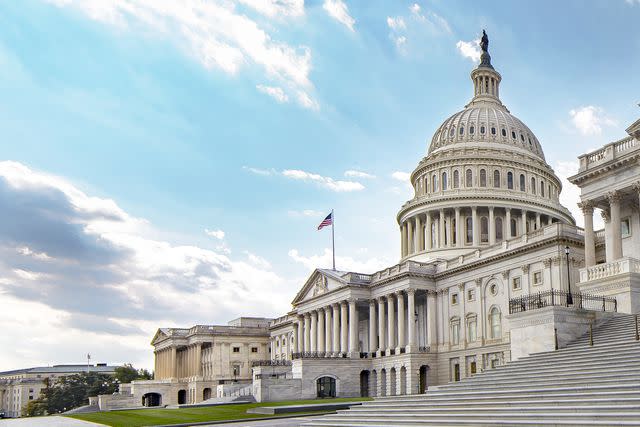How the Kids Online Safety Act Would Help Protect Your Children
If passed, this would be the most significant piece of legislation aimed at keeping kids safe online.

Jasmine Purdy for Parents / Getty Images
Fact checked by Sarah Scott
In a remarkable show of bipartisan support rarely seen in the United States Congress, the Senate is poised to pass the most sweeping piece of digital safety legislation to date, when it comes up for a vote. The Kids Online Safety Act (KOSA), led by Senators Richard Blumenthal (D-CT) and Marsha Blackburn (R-TN) is now co-sponsored by more than 62 Senators. It's not clear yet when the bill will head to the Senate floor.
You might have heard about KOSA as recently as late January when the CEOs of Meta, Snap, X, and Discord testified before a Senate Judiciary Committee Hearing. During that hearing, both Democratic and Republican lawmakers grilled the CEOs about their company's safety practices when it comes to kids. In a dramatic moment, Meta CEO Mark Zuckerberg stood up and apologized to those teens and families victimized on social media.
Not only is KOSA backed by a majority of Senators from both parties, but it also has the backing of more than 240 organizations. This includes child safety advocates, tech experts, faith leaders, pediatricians, and child psychologists. Among the big tech companies backing the bill are Nintendo of America, Microsoft, Snap, and X.
"KOSA is a crucial step in protecting children in the digital age," says Titania Jordan, the Chief Parent Officer with Bark Technologies. "It highlights a strong bipartisan effort to pass meaningful legislation given the current crisis we are seeing." Bark is a third-party app that helps parents monitor what their kids are doing on their phones.
So what is KOSA and does it go far enough to protect tweens and teens online?
What Does KOSA Do to Protect Kids Online?
The first version of KOSA was introduced in the Senate in May 2023 and a second, updated version was introduced in December 2023.
Much of the bipartisan support came after some more recent changes made to the bill. Senator Blumenthal's office tells Parents the changes were made "to reflect the intent of the legislation and clarify the language." The changes also came after conversations with various groups, as well as other Congressional colleagues, including the bill's champion in the House, Rep. Kathy Castor (D-FL).
In general, the bill provides kids and parents with safeguards and tools to help protect them on social media.
Privacy settings
KOSA requires social media platforms to default to the strongest privacy settings possible. So instead of kids having to "opt-in" to certain stringent privacy settings, KOSA makes those settings mandatory for those under age 13. They are still only provided as an option for those over the age of 13.
It also requires social media companies to provide those who are underage with options to protect their personal information, disable addictive product features, and opt out of personalized algorithms that make recommendations to them.
Parental controls
KOSA creates a dedicated channel for caregivers to report harmful behavior. It also gives parents new tools to help protect their kids, including the ability to restrict purchases and control privacy and account settings, as well as time spent on the platform.
But Jordan says, despite KOSA, these controls don't go far enough.
"The paltry parental controls provided by the social media companies themselves are smoke and mirrors, and they’re not enough to protect our children," explains Jordan. "While they may offer a small amount of insight and are a step in the right direction, they still leave gaping holes in their platforms."
Duty of care for online platforms
A big part of KOSA is that it creates a so-called "duty of care" for social media companies. That means the burden is on them to prevent and mitigate certain harm to teens and tweens when it is caused as a result of the companies' product design choices, such as algorithms and product features. That includes the promotion of dangerous behaviors and topics, particularly suicide, eating disorders, substance abuse, sexual exploitation, and the advertising of certain illegal products.
While KOSA sets a high standard for what social media companies can be held accountable for, the Federal Trade Commission (FTC) does have the power to enforce the duty of care.
Jordan believes this is a positive step forward. "In America, money talks, and if companies begin facing fines for their negligence, they’ll be motivated to actually put in the work for content moderation," she says. "We’ve seen them do it in other situations, so we know it can be done."
She gives the example of copyrighted music on social media. If you post a video using copyrighted music, platforms will remove it.
Keeping a watchful eye
KOSA also requires independent audits and research on how social media impacts the mental health and well-being of tweens and teens. By doing that, it ensures that social media companies and other online platforms are taking these critical steps to address the risks and concerns.
What Does KOSA Leave Out?
One of the big things KOSA does not address is Section 230 of the Communications Decency Act. Section 230 essentially protects internet-based companies from liability for user-generated content. Put simply, that means they can't be sued.
KOSA does not make social media companies liable for content they host or even choose to remove. There's a provision saying a company cannot be held liable for providing content that young users have explicitly searched for, which also includes searches for helpful resources like the National Suicide Hotline, for example.
While the FTC can enforce duty of care issues, KOSA does not give either the FTC or Attorneys General the power to file lawsuits surrounding content or speech. It also doesn't censor, block, or remove any content.
The majority of social media apps require a child to be 13 to create an account. Of course, many kids will find ways around that. KOSA stops short and does not provide for any age verification requirements or additional information from users. It also does not require teenagers to get permission from their parents.
"We all know that when it comes to technology (and especially social media), kids are usually savvier than their parents," adds Jordan. "And more importantly, we have yet to see an age-verification tool that doesn’t just let kids punch in their birthday as that of an adult."
KOSA only covers social media, multiplayer online video games, social messaging apps, and video streaming services. It doesn't include individual websites, blogs, or platforms run by non-profits.
As a tech company, Jordan says Bark Technologies "supports any legislation that reasonably seeks to make the internet a safer place for children, but without parental controls that actually work, social media will continue to be a dangerous place for kids."
Right now, many social media companies don't allow integration with third-party online safety apps like Bark. Jordan says their company can only do so much without that integration. She adds that she supports "Sammy's Law"—a bill introduced in the House of Representatives in September 2023. It would require companies to allow third-party safety apps onto their platforms.
"This would add a level of protection not currently in place, as the third-party safety apps have one and only one job: to keep kids safer online," explains Jordan.
LGBTQ+ Groups Drop Opposition to KOSA
Several prominent LGBTQ+ groups, including The Trevor Project, GLAAD, and Human Rights Campaign (just to name a few), had opposed earlier versions of KOSA. In a letter to Senator Blumenthal, which was provided to Parents, these groups wrote about how social media has created "incredible opportunities and support" for LGBTQ+ youth. That includes various resources, educational opportunities, and affirming spaces that they weren't finding in other places.
The groups were concerned that KOSA could "open the door to bad actors weaponizing the law to suppress affirming content for LGBTQ+ young people," according to the letter.
But the letter explains that with the recent changes to the bill, these groups will no longer oppose it, saying the changes will "significantly mitigate the risk of it being misused to suppress LGBTQ+ resources or stifle young people’s access to online communities."

Photo by Mike Kline (notkalvin) / Getty Images
What's Next for KOSA?
Once the Senate brings KOSA to the floor for a vote, presumably passing the bill, the next step is the House of Representatives. It has to pass there before ultimately heading to President Joe Biden's desk.
But the House is more divided politically and according to Forbes, the measure has not had the same amount of support there as it has in the Senate. The Forbes report says even if KOSA doesn't make it through the House, it could serve as a blueprint for any future negotiations on the issue, which could pass if the Democrats regain control in Congress.
As Jordan points out, laws that die in Congress don't help the growing problem online.
"The longer we wait to enact meaningful legislation on this issue, the more our children will be exposed to damaging and potentially deadly content (and people) online," she says. "Smartphones and social media have only really been prominent fixtures in our lives for about 15 years, and we’re just now starting to realize the profound negative effects they’re having on young people."
For more Parents news, make sure to sign up for our newsletter!
Read the original article on Parents.

